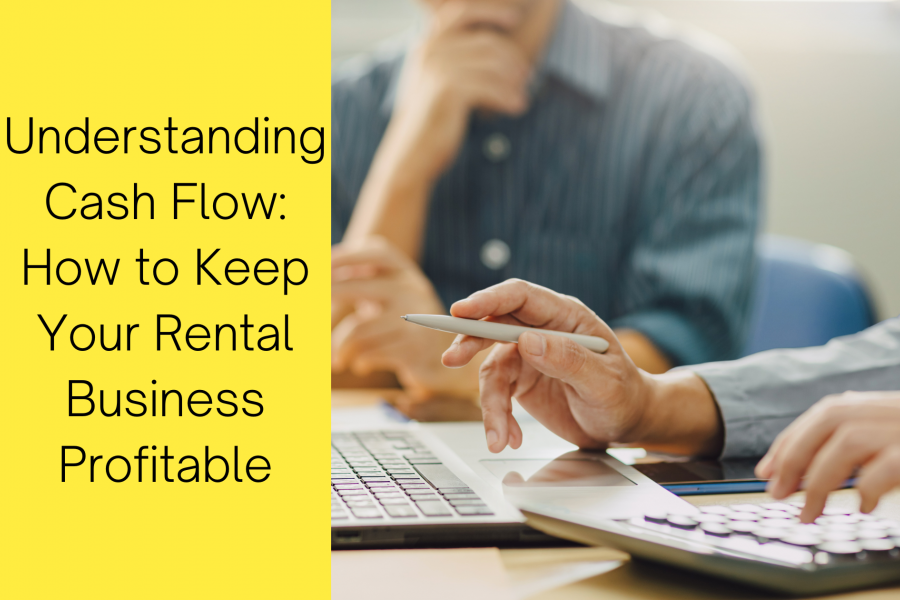
- Cash Flow Basics – Positive cash flow occurs when rental income exceeds expenses, making it essential for long-term profitability.
- Factors Affecting Cash Flow – Property location, maintenance costs, and vacancy rates all impact cash flow and should be carefully managed.
- Improving Cash Flow – Strategies like setting competitive rent, minimizing expenses, and screening reliable tenants help maximize cash flow.
- Long-Term Financial Planning – Regular financial reviews and adjusting rent to market conditions ensure sustainable rental income.
Sure, rent is the bread and butter of any rental investment. However, it may not tell the whole picture when it comes to your investment’s profitability. And this is where cash flow comes in!
You’ve probably heard it before; cash flow is king. And indeed it is! It’ll help you know how profitable and sustainable your rental investment is, or is going to be if you’re a prospective landlord.
At Mark Thomas Properties Property Management, we understand the importance of cash flow. In this blog, we’ll cover the basics and how they can help keep your rental business profitable. Keep reading to learn more!
What Is Cash Flow?
This is simply a description of how money is flowing in and out of a rental investment. Gross cash flow refers to the income the property generates in terms of rents and other income, such as fees and security deposit withholdings.
As for net cash flow, it refers to the amount that you’re left with after subtracting all the normal operating expenses. The expenses can include mortgage payments and the cost of repairs and maintenance.
As a budding landlord, your goal should be to invest in a property that generates a positive cash flow. This is a situation where the rental income exceeds the operational expenses.

How Can a Landlord Calculate Cash Flow on a Rental Property?
To accurately predict cash flow, there are four steps you must follow.
- Calculate gross cash flow. You’ll need to know all the money that you’re receiving per year. The income can come from a myriad of sources other than rent. Including rental application fees, appliance rent, pet rent, and late rent fees.
Now, let’s suppose that you charge a monthly rent of $1,000 and receive an additional income of $1,000 a year. In a year, that would be $13,000. But let’s assume that the unit has a vacancy rate of 6%. This would equate to 6/100 X 13,000 = $780. As such, the annual gross cash flow would amount to ($12,000+$1,000) - $780 = $12,220.
- Estimate the gross operating expenses. These are the operational expenses that go into owning and operating a rental property. Examples of these expenses include leasing fees, insurance, maintenance costs, and property management fees.
- Assume these add up to $5,000 a year.
- Calculate the Net Operating Income (NOI). To do this, you’ll need to subtract the gross income from the gross operating expenses. From the figures above, this would equate to $12,220-$5,000=$7,220.
- Finally, calculate the net cash flow after servicing your debts. You’ll need to subtract the debt service from the net operating expenses. Assuming that the debt service is, say $350, the annual debt service on the mortgage would be $350X12=$4,200.
The Net Cash Flow would be $7,220-$4,200=$3,020. This would be the annual cash flow for the property. To calculate the monthly cash flow, divide the amount by 12 months $3,020/12=$252.

How to Maintain Cash Flow for a Rental Property
Maintaining a positive cash flow is essential in running a profitable rental property. But to do that, there are a few things you’ll need to do in this regard.
Draft a Proper Lease
A lease is a contractual rental agreement binding both you and the tenant for a certain period of time. It helps define what responsibilities each party to the lease has. For example, each party’s repair and maintenance responsibilities.
This helps minimize potential conflicts and misunderstandings. Additionally, it can also help create additional income opportunities. Such as, a pet rent, or a late rent fee.
Market Vacancies Quickly
Vacancies can be costly to your bottom line. And every day your property remains vacant is money down the drain. As such, make sure to act quickly once the tenant notifies you that they will be moving out.
Have a robust marketing process for maximum exposure. Use a combination of both online and offline strategies. Including yard signs, social media, rental listing sites, and local dailies.
Update Your Rental Property
If your property looks like it has seen better days, you may have a difficult time trying to rent it out. Remember, you’re competing against other landlords, and your property needs that wow factor.
Upgrading key amenities, such as modern appliances, in-unit laundry, or smart home features, can make your rental more appealing and help attract tenants.

The following are some telltale signs that your property needs updating.
- It has outdated flooring, such as cracked tiles, worn-out carpets, or peeling linoleum.
- The paint is cracking, bubbling, or faded.
- There are damaged fixtures, such as chipped or cracked countertops, broken light fixtures, or rusty shower heads.
- Unreliable or inefficient appliances that frequently break down.
- Electrical issues, such as flickering lights, outdated wiring, or insufficient outlets.
If you notice any of these, it may be time to update your property.
Rent to a Quality Tenant
You won’t be able to maximize your cash flow if you’re renting to a difficult tenant who is inconsistent with rent payments or is causing damage beyond normal wear and tear.
The only way to maximize your cash flow is by renting to a quality tenant. Quality tenants pay rent on time, care for their rented premises, renew their leases multiple times, and report issues on time.
But for you to acquire such a tenant, you’ll need to use a meticulous screening process. You’ll need to vet tenants based on things like:
- How much income they are making.
- Their financial reliability.
- Their criminal, rental, and employment background.
Work with a Professional Property Manager
This goes without saying! In fact, this may be the only thing you need to do to streamline your cash flow. When you partner with a property management company, they handle rent collection, tenant screening, and maintenance, ensuring a steady income while reducing stress.
A property manager can help you in more ways than one. Including, helping you fill your vacancy with a quality tenant, charging the right rent amount, enforcing the lease, collecting rent, and staying compliant with state and local laws.
Bottom Line
Now you understand all the basics that go into keeping your rental business profitable. Alternatively, you can simply hire a reliable and professional property management company to help you in this regard.
Mark Thomas Properties Property Management is a full-service property management company. Our property management services ensure you get the highest level of service for your rentals for optimum ROI. Get in touch to learn more!
